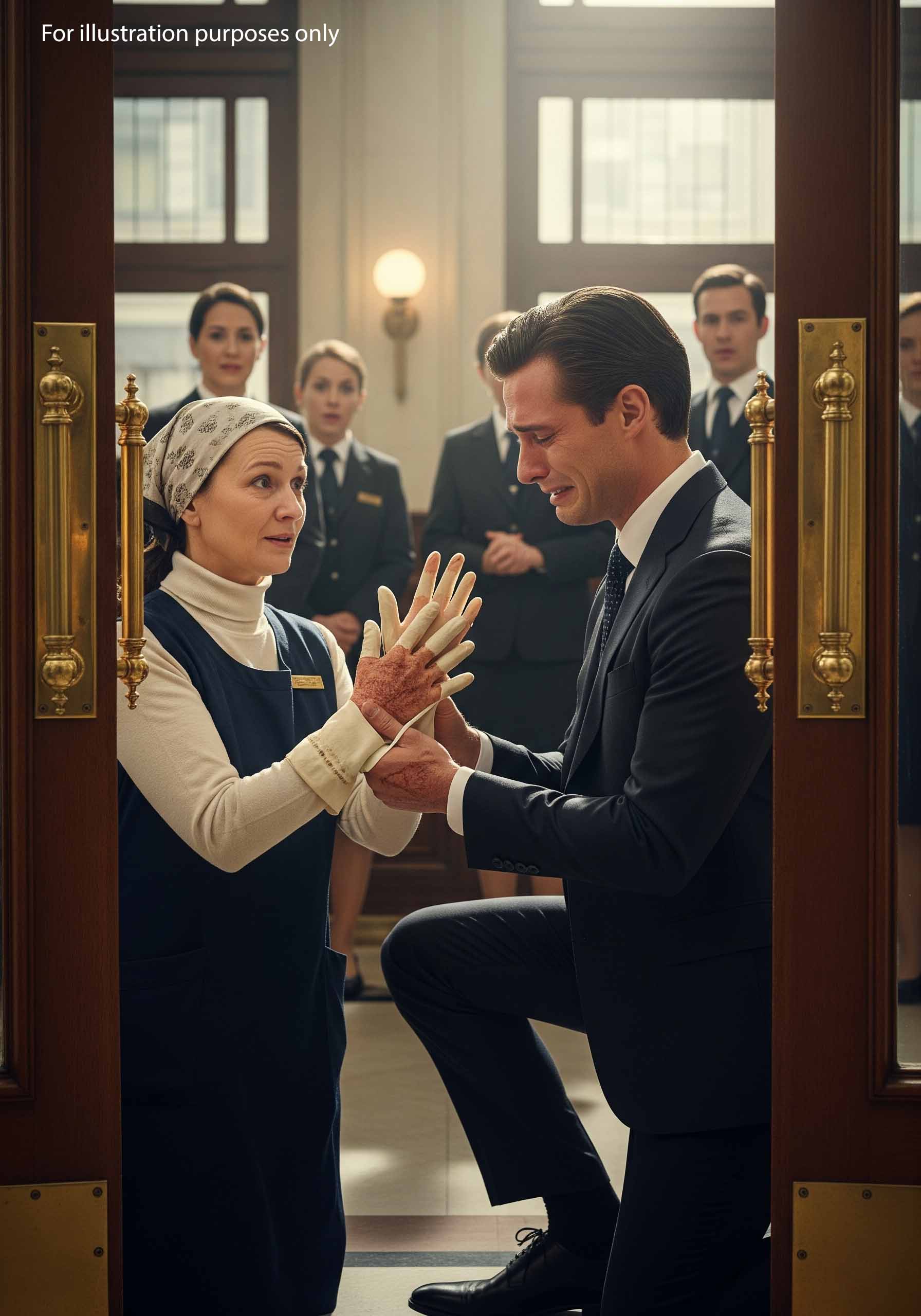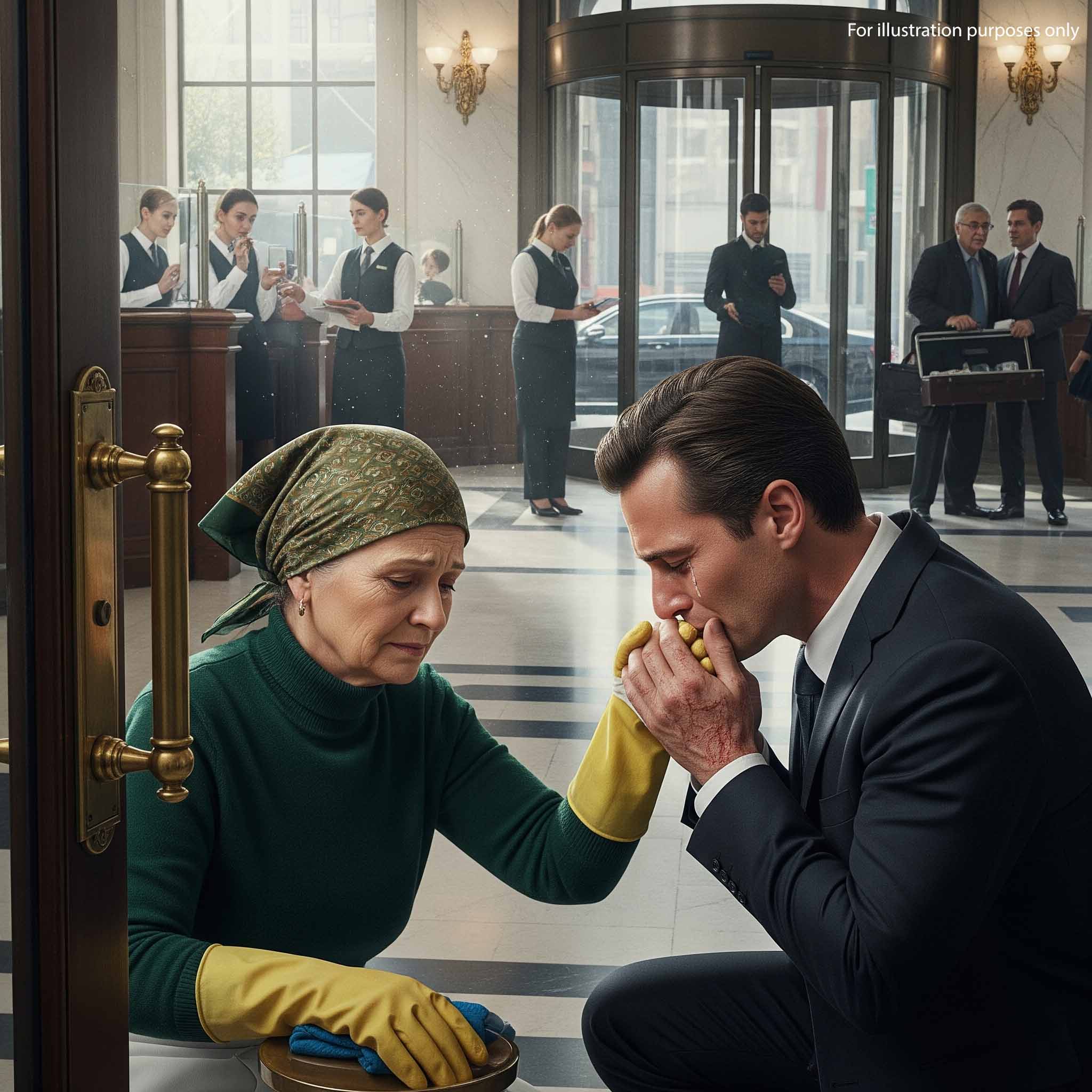For three months, the bank’s staff didn’t know her name.
She appeared every morning just before sunrise, her headscarf tied neatly, her gray turtleneck hugging her frame. Silent, almost spectral, she moved through the marble corridors like a shadow that smelled faintly of lemon and rain.
The brass handles gleamed under her hands. The floor reflected the ceiling lights like still water. Yet when people passed her, their eyes slid away as if she were part of the furniture.
Some whispered behind her back.
“Creepy how she never says a word.”
“She’s probably not all there.”
She never reacted. She just kept working, her gloved hands steady, her gaze downcast.

On the payroll, she was Aleptina. To most, she was simply the cleaner.
But that wasn’t her name once. And three years ago, her voice had been beautiful.
Her real name was Alia.
She used to be a teacher — the kind children trusted instantly. She painted in the evenings, watercolors mostly, flowers and sunlight spilling onto paper. Life was modest but whole.
Until the night everything changed.
It was a warm June evening. The last stroke of lilac on her canvas was still drying when a smell crawled into her apartment — acrid, sharp. Not cooking. Something worse.
Then came the screams.
Smoke snaked under her door. Alia grabbed her father’s toolbox and bolted across the hall. The door to her neighbors’ apartment wouldn’t budge. Inside lived a boy named Lesha and his parents.
She jammed the crowbar between the frame and the lock. The wood splintered. The heat hit her like a wave.
Flames clawed the wallpaper, black smoke clawed her lungs. On the floor — Lesha, limp, his mother sprawled beside him. Alia scooped the boy into her arms, but the hallway was already a wall of fire.
“Window!” she choked to herself, stumbling toward the light.
Below, firefighters shouted, a rescue net stretched tight. She pushed Lesha out into waiting hands.
The heat roared behind her. Her vision narrowed. And then — nothing.
She woke in the hospital days later, her arms and back swathed in bandages.
Lesha lived. His mother did not. His father disappeared.
The scars burned for months. But the greater wound was the silence that followed.
Her own mother’s heart gave out from the shock of the fire. Alia’s voice died with her.
Doctors called it psychogenic mutism. To Alia, it was simply… nothingness.
She left teaching. Days blurred into nights in a small apartment with only her fish tank for company. She painted. It was the only language left to her.
Eventually, her father convinced her to move somewhere cheaper. Work came in the form of cleaning — quiet work, where no one demanded small talk.
One job led to another. Eventually, she arrived at the bank.

And for three months, nothing changed.
Until the morning the black car arrived.
It slid to the curb like a shadow. Out stepped a man in a tailored suit, sunglasses cutting across his face. Whispers rustled through the staff.
The regional director.
He strode toward the doors — but halfway there, he stopped.
His eyes locked on her.
Aleptina was bent over the brass handles, yellow gloves catching the light. She didn’t notice him until his polished shoes appeared in her reflection.
She straightened, startled — and then, to the confusion of every employee watching, he walked right up to her.
And knelt.
Without a word, he peeled off her gloves. His hands trembled as he turned hers over, revealing the twisted, pale scars.
Then, to the collective gasp of the bank lobby, he pressed his lips to them.
“Alia,” he breathed, voice breaking, “I’ve been searching for you for years.”
The air went still. Phones stopped ringing.
“You… saved my son,” he said. “You gave him life. You gave me life.”
She blinked, disoriented, his words spinning in her mind. Son?
Lesha.
Her knees weakened. She gripped the counter.
The man — Sergei Mikhailovich — spoke quickly, as if afraid she might vanish. He told her how, after the fire, he’d lost himself in grief, left everything behind. How her name had never been in the papers. How every lead had ended in silence.
And now, here she was.
“I owe you everything,” he whispered. “Please… come with me.”
Her lips trembled. A sound rose in her throat, rusty, foreign.
One word emerged.
“…Lesha?”
Sergei’s eyes brimmed. He nodded. “He’s studying to be a doctor. Because of you. Because you taught him — without knowing — what it means to save a life.”
In the weeks that followed, the world Alia had hidden from came rushing back. Surgeons offered to treat her scars for free. Therapists coaxed her voice out from the dark.
News of the “silent cleaner who saved a child” rippled through the city. The same coworkers who once mocked her now stepped aside with quiet respect.
But Alia didn’t care for the attention.
She wanted only one thing. “Let me paint,” she told Sergei.
And so, months later, she stood in a small art gallery, surrounded by watercolors of firelight, lilacs, and hands — always hands — reaching for each other.
That’s when she saw him.
A young man, tall, a little awkward, with kind eyes.
“Hi,” he said, voice low. “I’m Lesha.”
Her chest ached. She reached out. His hand slid into hers — the same small hand she had pushed through a window all those years ago.
For a long moment, they stood there, silent.
And for the first time, silence didn’t feel empty. It felt whole.
Because heroes, she knew, don’t always need capes or medals. Sometimes, they just need to keep holding on — even when the world lets go.